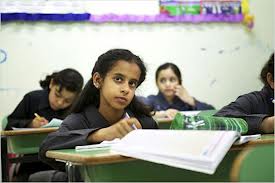
Quietly radical, Wadjda is a gentle, seemingly simple story about a girl growing up in Saudi Arabia who wants to earn enough money for a bike. But because our heroine lives in a repressive patriarchal culture, her quest isn’t so easy: Saudi society looks down on women riding bikes. But what could have been a one-dimensional condemnation develops into something deeper and richer. Wadjda means to open minds back home, but it may also surprise Western audiences because of its ability to dance around coming-of-age conventions.
Newcomer Waad Mohammed plays Wadjda, a 10-year-old living with her sweet mother (Reem Abdullah). Willful and calculating, Wadjda recognizes that her community puts restrictions on her—she’s constantly being upbraided for not covering her head in public—and yet she goes through life unconcerned, even if her desire to buy a prized used bike is considered odd by all those around her.
With her mother averse to giving her the money for the bike—and her father (Sultan Al Assaf) often away, for reasons Mom doesn’t want to think about—Wadjda hits upon a scheme that’s somewhat reminiscent of a device used in Hollywood studio comedies. At her girls’ school, there will be a competition to see which of the students is the most flawless in her recitation of Koranic verses. The winner will receive a cash prize that would secure the bike for Wadjda, which inspires the mischievous girl to apply herself and commit the Koran to heart.
Written and directed by Haifaa Al-Mansour, Wadjda has a distinct sense of time and place, and it’s the first film to be made entirely within Saudi Arabia—which makes the achievement of Al-Mansour, a woman, even more impressive. Al Mansour has studied in Egypt and Australia, and Wadjda (her full-length debut) very much feels like the work of a person who has a close connection to her homeland while at the same time bristling at some of its traditions. Still, the movie’s predominant sentiment is compassion—not just to Wadjda but also to a patriarchal culture that, according to the film, is starting to lose its stranglehold on the people, especially the young.
Rarely underlining her points when a subtle observation can be made instead, Al Mansour deftly shows us a Saudi Arabia in flux—a country embracing a traditional, religious conservatism while also making room for globalization and Western culture. (This is perhaps no better illustrated than by the fact that Wadjda’s love of fluffy pop songs is considered scandalous, while her father is able to enjoy playing violent videogames without fear of reprisal.) There are no villains in Wadjda, only stubborn teachers and adults who are holding onto old traditions for reasons they can’t quite justify anymore. Meanwhile, Wadjda and her friend—the charming Abdullah (Abdullrahman Al Gohani)—represent a more carefree generation that’s perhaps still immature but is nonetheless unwilling to accept their country’s staid customs.
Because Wadjda builds to a big competition set piece, there might be an expectation that this will become the focus of the plot. But Al-Mansour doesn’t go that direction, instead showing how Wadjda’s quest to win the prize money for a bike (a symbol of independence) must be done by reciting the Koran (a symbol of traditional values, including the subjugation of women). It’s a clever irony that Al-Mansour doesn’t overplay, and then she goes a step further by not making the competition’s resolution the film’s finale—merely the setup for a nuanced, more touching ending.
Full of pluck, Mohammed plays Wadjda with overflowing naturalness. She’s appeared in some Saudi theater, but Wadjda is her first onscreen role, and if she doesn’t dominate the film, that’s in part by design. Though Al-Mansour clearly looks at young people like Wadjda as signs of a hopeful, freer future Saudi Arabia, she resists the urge to turn her heroine into a tiny icon of this new era. Rather, she just lets Wadjda be a happy girl—which is all that a lot of young women in that part of the world want.
Tim Grierson is chief film critic for Paste. You can follow him on Twitter.
Director: Haifaa Al-Mansour
Writer: Haifaa Al-Mansour
Starring: Reem Abdullah, Waad Mohammed, Abdullrahman Al Gohani, Ahd, Sultan Al Assaf
Release Date: Sept. 13, 2013